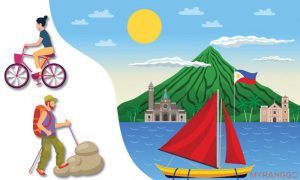24 Tips for Hospitality Bounce Back!
Originally featured by MY RANGGO Magazine 17 April 2020
Hospitality Bounce Back is vital to kick start the economy. And to get people back in to work. But how realistic is it to expect “business as normal” once Lock Down is lifted? Can we rely on a foreign travel market booking holidays, hotels or visiting restaurants immediately?
Don’t forget to check out our Article 12 Tips for Adapting Your Business during Lock-Down
Hospitality Bounce-Back: Industry Predictions
In the April 2020 Sentiment Survey by Horwath HTL Singapore, 31% of Philippine hospitality respondents said they believe the COVID impact will be felt in the Philippines for more than 4 months after Lock Down is lifted. 33% believe the impact will be felt for more than 6 months.
Most of the hotels who took part in the survey are expecting a 50% loss in total revenue by the end of 2020. Whilst the survey was carried out with the Philippine hospitality industry it is reasonable to assume this is the expectation for hospitality stakeholders across the World.
Chris Webber, head of marketplace at icelolly.com predicts that that the hospitality bounce-back recovery will begin with Domestic Tourism in Sept/Oct 2020. He feels strongly that Governments should support their domestic and international airlines with funding or subsidies, as they are critical to tourism and hospitality bounce-back and growth.
James Thornton, CEO Intrepid Group predicts that besides Domestic Business Tourism, isolated ‘clean’ destinations will bounce-back first. Those destinations which were barely affected by COVID.
Tourists will be looking for destinations offering a lot of outside activities and experiences, including celebratory festivals.
More travelers will look for eco-friendly and sustainable holidays. And community-based tourism, where their visit can benefit local communities.
Debbie Hindle, CEO Travel Four Communications. People in Lock-down are already planning their 2021 holiday according to Search Engine data. Hindle predicts that people will be booking long-haul destinations which hold good memories for them. Long-term advance planning for hotels and destinations is therefore vital for any recovery business plan.
Amanda Hills, President MMGY Hills Balfour Europe and Middle East agrees with Thornton. Travelers will want off-the-beaten-track, final frontier travel and ‘YOLO’ type adventures. Hills encourages the industry to be ready with value added offers and packages that can launch as soon as the travel pause is safely lifted.
Travel & Hospitality Bounce-Back: Timetable.
Atmosphere Research Group agrees with these industry predictions. Their research predicts the recovery will be a gradual return and it will be led by Business and Domestic Tourism. They highlight 4 phases to the recovery:
6-9 Months – The ‘tiptoe travelers’ will be the first to travel. This group includes business travelers and the “better educated, highest income groups”. Most will stick to domestic travel but some will take international trips.
8-16 Month – The ‘Pioneers’ (through to mid-2022) will start travelling. This will be business travelers and the mid-to high-tier frequent flyers. These travelers will most likely being booking international holidays.
12-18 Months – The ‘Fast Followers’. Business travel will mostly be back to normal and more travelers will start to travel internationally again.
16-24 Months – The Leisure Travelers levels will reach “80-90% of pre-virus leisure volume”
24+ Months (2023) Travel is expected to be “at or above pre-virus traffic”.
Hospitality Bounce-Back: Tips for Attracting Back Tourists
MY RANGGO’s tips have been gathered from Industry Experts and experienced colleagues working in the Philippine Hospitality Industry or Digital Marketing Industry.
Reassure your guests – build trust by publishing up-to-date messages on your social media and website. Be clear about the general safety of your hotel and destination, and any measures the local government and you are taking to minimize risk.
Once your destination is open again communicate anything your guest will need to know. There may be specific destination entry requirements for travelers. Visitors may be required to show a medical certificate, or their passport showing history of travel etc to be allowed entry. Make sure you explain this to them on your social media pages and booking confirmation emails.
Assure guests that their safety is always your priority. Promote these messages specifically to potential Domestic Tourists with a social media paid Advert.
Additional Advertising & Marketing – now is the time to spend a little more on advertising and marketing. Whether that’s time or money. You should ensure that you are posting regularly on your social media platforms now.
Whether it’s images you’ve used before, of your rooms or restaurants. Or current photos of the nearby beach looking glorious. Get sharing them now! People are trapped at home and seeking out images to dream about.
Online and in-print advertising is a must to catch people’s attention. Check out MY RANGGO’s Advertising Rates Here with our PDF Download
Use the Industry Predictions: As above, the industry predictions are that Domestic Business and Domestic Tourism will be the first groups to emerge. Tailor packages, deals and marketing to these groups, to include hotel stays and access to the facilities and services you offer.
But have deals and packages ready for the 2021 market too. Try to tailor once-in-a-lifetime experiences, off-the-beaten-track and outdoor activities with local providers. If your hotel is hot on eco-sustainability market this hard.
Encourage Direct Bookings – offer flexible rates, packages, additional inclusions, Discounted Early Bird deals and cancellation/re-booking options to encourage guests to book direct with you.
Ralph Hollister, a travel and tourism analyst for GlobalData, cautions against just offering discounts, rather than Special Deals with inclusions. “Hotels that are the fastest to drop their room rates and who provide the heaviest discounts will often be the last ones to recover when demand eventually returns. Many hotels will not be able to return to their normal rates instantly after demand for travel returns.” [TravelPulse]
Sunish Sadasivan, Vice President of E-Commerce & Revenue Management at Chroma Hospitality: “In the 2008 Financial crisis, we panicked and dropped our rates significantly. When the time came to analyze results, we found that we lost in terms of RevPAR compared to some of the competitors who stuck to their rates.” [Triptease]
Offer Flexible Cancellation Policies – relax your cancellation policies and consider offering re-booking solutions, especially for advance bookings and returning guests, or club members. This removes the feeling of risk for guests and encourages confidence in booking with you. Promote this with pop-ups on your website Home Page and posts on your social media pages.
Offer Travel Bundles – work with local tour and service providers to create tailored promotions and bundles.
Include outside activities, community experiences, Festivals, local food and culture experiences.
Advance Up-selling – If you have an in-house restaurant, shop, spa, salon, offer discounts to encourage guests to make a direct booking with you. If guests are booking for dates which include a special holiday, offer them the opportunity to book a table in your restaurant in advance.
Special Offers for VIP and returning guests – focus your efforts on advance 2021 bookings with special offers, extras and flexible re-booking terms.
Email your previous guests with a re-assuring email that the hotel and staff are well and looking forward to a return visit from them etc.
Hospitality Bounce-Back: Looking After Your Staff Team
- Have a clear Health & Safety Policy and Plan and explain it to employees
- Keep employees who live in affected areas in home quarantine, or return them to destination with a minimum 14 days self-quarantine prior to starting work
- Implement Social Distancing Measures in back offices, at Front Desk, in elevators, in restaurants
- Washable Masks for staff
- Spend time on Staff Retraining and Skills Enhancement
Hospitality Bounce-Back: Reducing Overheads/Costs
Having taken a significant hit financially during the extended lock-down. And expecting that it could be as long as 12-18 months before foreign tourism is back to 2019 levels, cost control measures need to be considered. These might include:-
– Reducing F&B Operating Hours
– Reducing F&B Outlets
– Partial Closure of hotel rooms or hotel floors
– Full closure of whole hotel
– Hiring Freeze
– Postponing CapEx (Capital Expenditure); funds used by a company to acquire, upgrade, and maintain physical assets such as property, buildings etc
– Mandatory Clearing of Paid Leave
– Mandatory Unpaid Leave
– Reducing Part-time Staff
– Reducing Full-Time Staff
Hospitality Bounce-Back: Government Assistance
In the Sentiment Survey many of the respondents felt that Government help would be needed for the Philippine Tourism Industry to survive this period. With help in the form of Marketing Promotions supported by the Department of Tourism, Tax incentives (such as income tax and property tax holiday’s) and Government Subsidies (cash hand-outs) in the immediate.
What the Philippine Department of Tourism is doing to help the industry:-
- Issued a moratorium on the collection of DOT accreditation fees from new and renewing applicants from tourism- and tourism-related enterprises for 2020.
- Waiver of participation fees for International Fairs and Expo’s until the end of 2021.
- Negotiated Loan Interest Loan options with the Development Bank of the Philippines (Rehabilitation Support Program on Severe Events Scheme) and the Land Bank of the Philippines (Rehabilitation Support to Cushion Unfavorably Affected Enterprises (I-Rescue) Loan)
- Deferment of Tourism worker contributions to Social Security System (SSS), Pag-Ibig Fund and PhilHealth. SSS and Pag-Ibig have both extended the deadline for payment or premium contributions, for the 1st quarter 2020, to 30th April 2020. Philhealth has extended the deadline to remit members’ savings or contributions, without penalty, to two weeks after the lifting of the ECQ period.
- Negotiating a deferment with the Bureau of Internal Revenue regarding the collection of corporate income tax payments from travel industry stakeholders.
- Secured sign up with hotel establishments for rooms for Front Liners, Essential Workers, BPO companies, OFW’s and stranded or in transit foreign tourists. Some hotels have also been signed up to act as a COVID 19 facility
- Negotiated a deferment of aeronautical fees for domestic airlines with Department of Transport.
- Negotiated a deferment of fees on behalf of NAIA, Clark and Mactan Cebu Airports







No responses yet